New Delhi:Poetry lovers gathered under a full moon at New Delhi’s India International Centre to discuss and revel in the works of renowned “moonsmith”, Gulzar. The catalyst for this lyrical trip down memory lane was Shailja Chandra’s book, The Moonsmith: Gulzar Orbiting the Celebrated Words (2021).
It was as though the moon of Gulzar’s poetry had descended, inspiring a lively exchange of ideas, readings, and shared appreciation for his art.
“When I was going through his work, I realised there was so much literary heritage,” said Chandra at the panel discussion on 4 May with Saba Bashir, assistant professor at Jamia Millia Islamia, retired professor from Delhi University Malashri Lal and screenwriter Atul Tiwari.

While sifting through Gulzar’s body of work, Chandra hit upon the idea of dividing the book into nine chapters, each dealing with a particular theme of his poetry. One chapter is devoted to conversations with ‘Bade Miyan’ or God, another on his writings on life, a third on the nature of time. From soil to society, The Moonsmith examines every aspect of Gulzar’s poems.
In explaining the unique approach of her book, Chandra emphasised her focus on Gulzar’s literary works rather than his cinematic achievements. She went on to highlight the book’s portrayal of the artist as a combination of a sensitive poet, a novel philosopher and a pragmatist.
“Gulzar himself has regarded the book as one of the best works on his works,” said screenwriter Atul Tiwari who is Gulzar’s friend. He talked about the poet’s fondness for the moon and how it has been an integral part of his poetry.
To illustrate this point, Tiwari recited the nazm (a string of poetry verses) ‘ek nazm meri chori kar li kal raat kisi ne,’ which tells the story of how Gulzar once lost his poem and later found that it was being recited by the moon as if it was its own’.
Gulzar’s poetry is never dated—and that is because of his insistence on art being a reflection of reality.
“An artist has to represent the time he is living in and Gulzar’s poetry does that beautifully,” said Bashir. She cited examples like Yaaram—a song in Hindi movie Ek Thi Daayan (2013) in which a woman talks about how she would carry the lover’s files, his laptop, diary and keys, along with her heart.
Also read: When will Gulzar retire? The poet, Bollywood lyricist gave an answer during his America tour
Gulzar’s socio-political works
Tiwari suggested that Chandra’s book would have benefitted from an additional chapter on Gulzar’s socio-political works. He cited examples of his films like Aandhi (1975), which was based on the Emergency, and Maachis (1996), which explored the issue of Sikh militancy.
“He may have written fewer political poems, but he has the ability to be effortlessly political,” said Tiwari, who then went on to recite some of Gulzar’s poems on socio-political issues, including one about the Narmada dam and GST.
During the panel discussion, Lal talked about the duality of Gulzar’s poetic voice, noting his ability to adapt his words to different mediums, especially in the context of his cinematic works.
“Gulzar is an interchangeable poet who would use words differently when used in a cinematic context,” she said. For example, he modified Amir Khusro’s famous ghazal Zihal-e- Miskin and used it in film Ghulami (1985), and wrote a new song inspired by the first two lines of the ghazal.
If any person has a conversation with Gulzar, they can end up writing a book because they are so profound and deep, Lal said.
Chandra recalled Gulzar’s diary of verses. During their interactions, he would read his new creations from it, she said. “He called them kachchi nazm and would say, ‘Ye abhi paki nahi hai’ (this has not ready yet).’”
(Edited by Ratan Priya)



